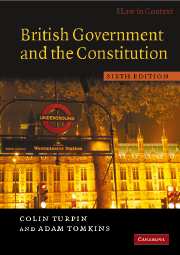Book contents
- Frontmatter
- Contents
- Preface
- Acknowledgements
- Abbreviations
- Table of Cases
- Table of Statutes
- Table of European Treaties
- Part I Constitution, state and beyond
- 1 The British constitutional order
- 2 The ideas of the constitution
- 3 Constitutional sources
- 4 Devolution and the structure of the United Kingdom
- 5 The European dimensions
- Part II Government
- Part III Accountability
- Part IV Liberty
- Index
1 - The British constitutional order
Published online by Cambridge University Press: 05 June 2012
- Frontmatter
- Contents
- Preface
- Acknowledgements
- Abbreviations
- Table of Cases
- Table of Statutes
- Table of European Treaties
- Part I Constitution, state and beyond
- 1 The British constitutional order
- 2 The ideas of the constitution
- 3 Constitutional sources
- 4 Devolution and the structure of the United Kingdom
- 5 The European dimensions
- Part II Government
- Part III Accountability
- Part IV Liberty
- Index
Summary
Nature of the British constitution
Almost every country in the world has a written constitution which is a declaration of the country's supreme law. All other laws and all the institutions of such a state are subordinate to the written constitution, which is intended to be an enduring statement of fundamental principles. The absence of this kind of supreme instrument in the governmental system of the United Kingdom often perplexes the foreign inquirer, who may wonder where our constitution is to be found, and indeed whether we have one at all.
What, then, do we mean when we speak of the British constitution? Plainly there exists a body of rules that govern the political system, the exercise of public authority, the relations between the citizen and the state. The fact that the main rules of these kinds are not set out in a single, formal document does make for some difficulty in describing our constitution, although even in a country with a written constitution we soon discover that not all the arrangements for its government are to be found there: many elements of the constitution will have to be looked for elsewhere than in the primary document labelled ‘the Constitution’. (The formal constitution may even be misleading, for we are warned by a Frenchman, Léon Duguit, that ‘the facts are stronger than constitutions’, and by an American, Roscoe Pound, that the ‘law in books’ is not necessarily the same as the ‘law in action’.)
- Type
- Chapter
- Information
- British Government and the ConstitutionText and Materials, pp. 3 - 32Publisher: Cambridge University PressPrint publication year: 2007

